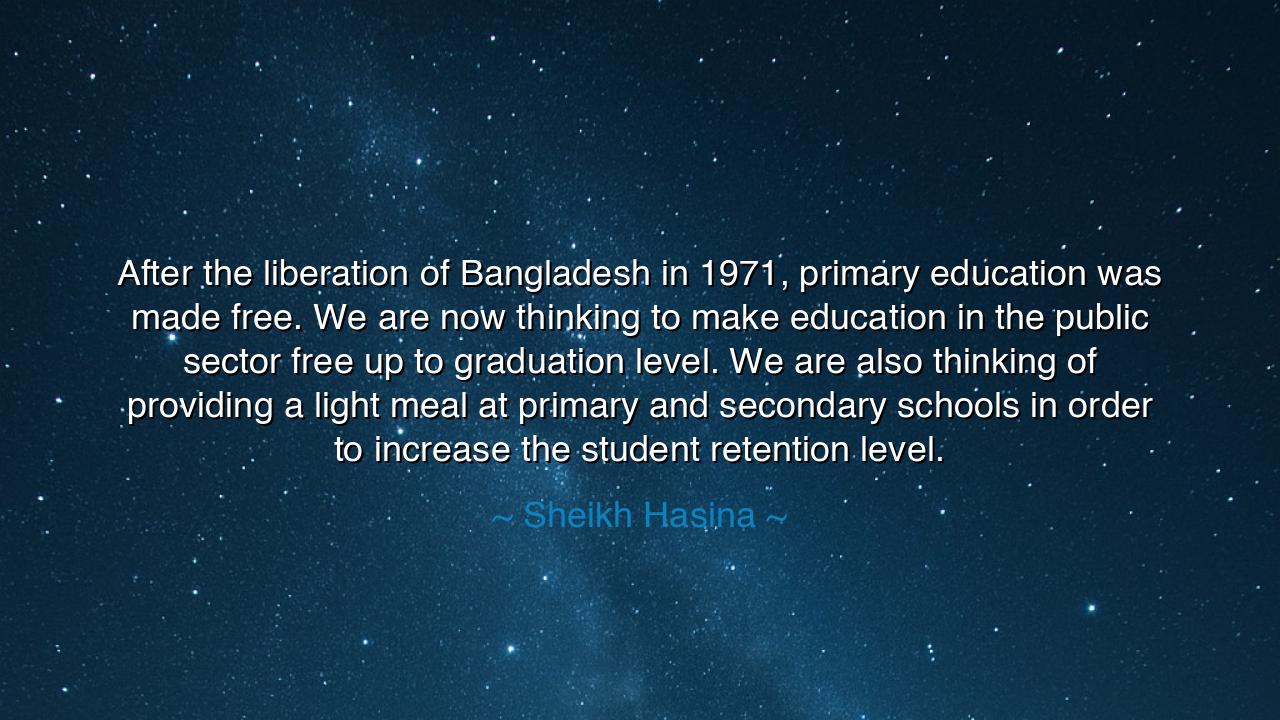
After the liberation of Bangladesh in 1971, primary education was
After the liberation of Bangladesh in 1971, primary education was made free. We are now thinking to make education in the public sector free up to graduation level. We are also thinking of providing a light meal at primary and secondary schools in order to increase the student retention level.






The Prime Minister of Bangladesh, Sheikh Hasina, once spoke with both humility and vision when she declared: “After the liberation of Bangladesh in 1971, primary education was made free. We are now thinking to make education in the public sector free up to graduation level. We are also thinking of providing a light meal at primary and secondary schools in order to increase the student retention level.” To the untrained ear, these words might sound like policy — simple, administrative, and practical. Yet to the heart that listens deeply, they ring with the timeless music of liberation, compassion, and the moral duty of leadership. For in this statement lies the ancient truth that a nation’s true wealth is not its land, nor its gold, but the wisdom of its people, and that education is the divine fire through which nations rise from darkness into light.
To understand the power of these words, one must remember their origin — the ashes of a war-torn nation. In 1971, Bangladesh was born through fire, through immense struggle and sacrifice. The soil that had witnessed oppression, famine, and death now yearned for rebirth. In that sacred moment of liberation, the leaders of the new nation made a vow — that the chains of illiteracy would no longer bind their people. Free primary education became the first seed of this vow, a promise that no child would be denied the right to learn simply because of poverty. Sheikh Hasina’s words, decades later, carry the torch of that promise forward, envisioning not only education for the young but education for all, from childhood to the gates of adulthood.
Her vision reflects one of the oldest truths known to civilization: that knowledge is freedom. The philosopher Plato once said that education is the turning of the soul toward the light. When a nation educates its citizens, it does more than train workers; it awakens thinkers, builders, and dreamers. For a people once bound by colonization and struggle, free education is not charity — it is justice restored. By extending it “up to graduation level,” Hasina speaks to the evolution of a country determined not only to survive but to flourish — to nurture doctors, scientists, artists, and leaders who will carry the flame of Bangladesh into the future.
Even more powerful is her mention of “a light meal at primary and secondary schools.” At first, it seems a humble gesture — a meal, a plate of rice, a piece of bread. Yet in truth, this is a feast of dignity. Across the world, hunger remains one of education’s most silent enemies. Many children leave school not because they lack curiosity, but because they lack nourishment. In promising food, Sheikh Hasina promises more than sustenance — she promises hope. For a hungry child cannot dream; a fed child can imagine. This act transforms schools into sanctuaries, where the body and the mind are both cared for — where learning is not a privilege but a birthright.
History offers us many mirrors to this vision. In the years after World War II, Japan, devastated and destitute, made education the cornerstone of its recovery. Leaders decided that rebuilding minds would rebuild the nation. Within decades, Japan rose from ruin to prosperity, its strength rooted not in weapons, but in knowledge. Similarly, Hasina’s vision echoes that same faith — that a nation’s truest revolution is not of arms, but of education. Her resolve is not for one generation alone but for centuries yet unborn, who will inherit the fruits of this sacred labor.
The lesson, then, is profound and eternal: the truest measure of progress is how deeply a society invests in the education of its poorest child. A wise leader looks not at the riches of today, but at the seeds of tomorrow. Education is not merely the filling of minds but the lifting of souls; not a policy, but a promise — that no dream shall perish for lack of opportunity. If you are a teacher, teach with love; if you are a parent, nurture the hunger to learn; if you are a leader, remember that the pen and the plate are mightier together than any sword.
And so, let the words of Sheikh Hasina stand as both vision and vow: “We are now thinking to make education in the public sector free up to graduation level.” For the liberation of a nation is not completed by the end of war, but by the enlightenment of its people. A free nation that does not educate is only half-free. But when the poorest child in the farthest village holds a book in one hand and food in the other, then, and only then, can we say that the dream of independence has become the reality of civilization.






AAdministratorAdministrator
Welcome, honored guests. Please leave a comment, we will respond soon